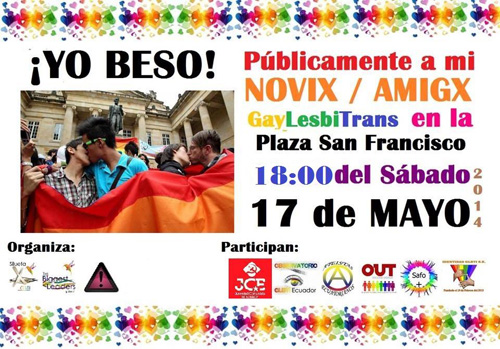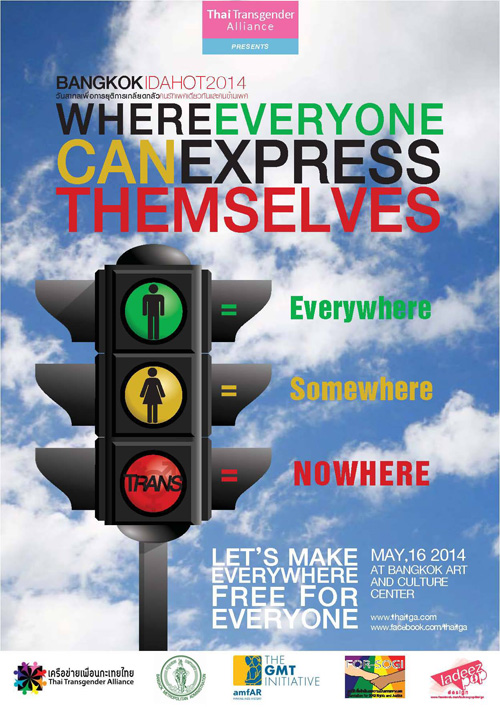Posted by Lucile Scott on May 16, 2014

Silueta X will hold its Guayaquil Kiss-In at the Plaza San Francisco.
May 17 marks the 10th anniversary of International Day Against Homophobia and Transphobia (IDAHOT). IDAHOT was launched in 2004 to increase awareness about the violence and discrimination LGBT people face each day. To observe the day, LGBT groups and advocates worldwide organize events to oppose discrimination, garner media attention, network, and mobilize new constituencies. Each year the day’s scope and impact has grown, and last year events took place in nearly 120 countries around the globe. Below is what several GMT Initiative grantee partners will be up to on Saturday. Find a listing of events near you or get ideas for organizing an event of your own here.
• Asociación Silueta X in Guayaquil, Ecuador, is holding simultaneous public Kiss-Ins in Guayaquil and the city of Cuenca to raise awareness about homophobia and transphobia. “As Martin Luther King said, ‘Civil disobedience, not violence,’” says Silueta X founder Diane Rodriguez. “The Kiss-Ins are a peaceful reaction to the murders and violence in the LGBT community. One of our posters will say, ‘Bring Back our Murdered Trans Girls,’ and another will say, ‘A kiss to the mayors of Guayaquil and Cuenca, so they will approve our anti-discrimination bills.”
• SEROvie in Port-au-Prince, Haiti, has organized a day full of artistic events condemning homophobia and transphobia. The planned activities include plays, public speeches against gender-based violence, LGBT film screenings, and a concert. “For SEROvie, IDAHOT is a day of reflection and collective action against the exclusion of LGBT people, and a day to promote the recognition of our human rights with respect to our sexual orientation and gender identity,” says Steeve Laguerre, executive director of SEROvie.

ThaiTGA’s IDAHOT conference will take place at the Bangkok Art and Culture Center.
• Men Against AIDS Youth Group (MAAYGO) in Kisumu, Kenya, is hosting a luncheon, in partnership with the NYAWEK LGBTI coalition, for local opinion leaders, including police, village elders, and community sub chiefs and chiefs. The attendees will discuss ways to combat the stigma and discrimination that LGBT face. “We decided to organize this meeting instead of a protest because, as activists, we thought addressing the critical issue that homophobia and transphobia are increasing in Kenya with key opinion leaders one on one could have more impact and create change in society,” says MAAYGO’s Henry Victor Digolo.
• Transgender and Intersex Africa (TIA) in Pretoria, South Africa helped organize an all-day community gathering on Johannesburg’s Constitution Hill that will include speakers, poets, and artists. “We cannot be truly free as a country when there are inequalities and violations against minority groups,” says Nthabiseng Mokoena, TIA’s advocacy coordinator. “Even though legislation in our country is progressive, we still live in a country where communities are not tolerant of gender diverse people, discrimination is still prevalent in health care facilities and transgender people still struggle to access employment and educational opportunities.”
• The Thai Transgender Alliance (ThaiTGA) in Bangkok, Thailand, is hosting a conference titled Freedom of Expression to Gender Recognition on May 16 from 12:00 p.m. to 18:30 p.m. at the Bangkok Art and Culture Center, with co-hosts the Bangkok Metropolitan Administration, amfAR, and The Foundation for SOGI rights and Justice. The event will include remarks by Dr. Bhoodsadee Tamthai, deputy governor of Bangkok, and Poy Treechada, a famous trans celebrity. “Recently in Thailand, many trans women have been denied to access to nightclubs, bars, and restaurants, and to women's restrooms. In addition, there were a number of trans women rejected from employment due to stigma and prejudice towards trans identity,” says TGA’s Rena Janamnuaysook. “This event emphasizes the importance of the fundamental human rights of trans people in Thailand.”